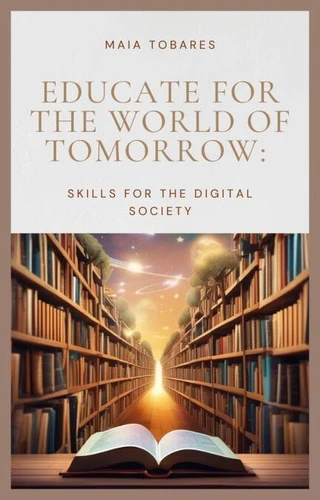Educate For The World Of Tomorrow: Skills For The Digital Society
Par :Formats :
Disponible dans votre compte client Decitre ou Furet du Nord dès validation de votre commande. Le format ePub est :
- Compatible avec une lecture sur My Vivlio (smartphone, tablette, ordinateur)
- Compatible avec une lecture sur liseuses Vivlio
- Pour les liseuses autres que Vivlio, vous devez utiliser le logiciel Adobe Digital Edition. Non compatible avec la lecture sur les liseuses Kindle, Remarkable et Sony
 , qui est-ce ?
, qui est-ce ?Notre partenaire de plateforme de lecture numérique où vous retrouverez l'ensemble de vos ebooks gratuitement
Pour en savoir plus sur nos ebooks, consultez notre aide en ligne ici
- FormatePub
- ISBN8230074588
- EAN9798230074588
- Date de parution28/11/2024
- Protection num.pas de protection
- Infos supplémentairesepub
- ÉditeurIndependently Published
Résumé
Digitalization and technological advances have transformed almost every aspect of our lives, including how we learn, work and interact with the world. To face these changes, it is crucial that educational systems evolve, training new generations with the skills and abilities necessary to thrive in a digital and globalized society. It's eBook, Educating for the World of Tomorrow: Skills for the Digital Society, offers a tour of the key competencies that students must develop, from critical thinking and media literacy to collaboration in digital environments, creativity and ethics in the use of technology.
Through chapters aimed at educators, parents and students alike, pedagogical practices and tools are explored that not only improve the educational experience, but also encourage autonomous, flexible learning adapted to the challenges of the future. In addition, fundamental topics are addressed such as equity in access to technology, preparation for future work demands, socio-emotional education, and the role of parents in digital education.
With an inclusive vision and an ethical perspective, the book seeks to become a complete guide for those who want to prepare students for a constantly changing world, where knowledge, digital skills and social responsibility are essential.
Through chapters aimed at educators, parents and students alike, pedagogical practices and tools are explored that not only improve the educational experience, but also encourage autonomous, flexible learning adapted to the challenges of the future. In addition, fundamental topics are addressed such as equity in access to technology, preparation for future work demands, socio-emotional education, and the role of parents in digital education.
With an inclusive vision and an ethical perspective, the book seeks to become a complete guide for those who want to prepare students for a constantly changing world, where knowledge, digital skills and social responsibility are essential.
Digitalization and technological advances have transformed almost every aspect of our lives, including how we learn, work and interact with the world. To face these changes, it is crucial that educational systems evolve, training new generations with the skills and abilities necessary to thrive in a digital and globalized society. It's eBook, Educating for the World of Tomorrow: Skills for the Digital Society, offers a tour of the key competencies that students must develop, from critical thinking and media literacy to collaboration in digital environments, creativity and ethics in the use of technology.
Through chapters aimed at educators, parents and students alike, pedagogical practices and tools are explored that not only improve the educational experience, but also encourage autonomous, flexible learning adapted to the challenges of the future. In addition, fundamental topics are addressed such as equity in access to technology, preparation for future work demands, socio-emotional education, and the role of parents in digital education.
With an inclusive vision and an ethical perspective, the book seeks to become a complete guide for those who want to prepare students for a constantly changing world, where knowledge, digital skills and social responsibility are essential.
Through chapters aimed at educators, parents and students alike, pedagogical practices and tools are explored that not only improve the educational experience, but also encourage autonomous, flexible learning adapted to the challenges of the future. In addition, fundamental topics are addressed such as equity in access to technology, preparation for future work demands, socio-emotional education, and the role of parents in digital education.
With an inclusive vision and an ethical perspective, the book seeks to become a complete guide for those who want to prepare students for a constantly changing world, where knowledge, digital skills and social responsibility are essential.























